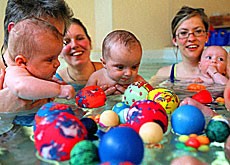Swiss birth rate lowest for 25 years

The number of babies being born in Switzerland has fallen to its lowest level for a quarter of a century, according to official figures.
Experts say the trend is likely to continue in the future, as family structures change and more women try to combine a career with raising children.
Population figures published on Tuesday by the Federal Statistics Office show that 71,800 children were born in 2003 – 0.7 per cent fewer than the previous year.
“The annual number of live births has been declining in an almost constant manner since 1993,” said the Statistics Office in a statement.
“With the exception of 1978 and 1979, it hasn’t been this low since the 1930s,” it added.
Officials said the number of births per woman had also sunk to its lowest rate ever at 1.37.
This figure has fallen dramatically in the past 15 years: it stood at 1.59 in 1990.
Women are also choosing to have children later in life, with three in five mothers aged 30 or over when they give birth.
Trend
Beat Fux, from the Institute of Sociology at Zurich University, says Switzerland is not alone: the number of children born in most western European countries has been declining for 40 years.
“In the late 1960s the value system changed, and much more importance is now being given to gender equality,” Fux told swissinfo.
“Women are more frequently getting higher education and are intent on using their education by participating in the labour force,” he added.
Fux said some countries continued to make life difficult for women who want both a career and a family.
In Switzerland there is still no statutory paid maternity leave. A survey published on Tuesday by Travail.Suisse, one of the country’s biggest trade unions, found that many women are still unaware of their working rights during pregnancy.
The country is due to vote at the end of September on whether to grant mothers 14 weeks’ paid leave.
Outside wedlock
Another interesting development for Fux is the spiralling rate of babies born outside wedlock.
The survey found that the number of non-married women giving birth stood at 12.4 per cent in 2003, compared with 11.7 per cent the previous year. This figure has doubled since 1992.
“It seems that until the late 1990s it was relatively difficult to have children as an unmarried couple. But since then it has become more and more accepted,” Fux told swissinfo, adding that the practice was still frowned upon in some rural areas.
Future
Fux warned, however, that the trend towards lower birth rates in Switzerland was likely to have some negative effects on society.
“The process of ageing will continue and this will lead to the aggravation of the problem of how to finance social welfare,” he said.
He said more family-friendly policies might persuade women to combine family and career. But he added that measures to encourage women to have more children generally had very little impact.
“In all highly developed countries we have no reason to expect an important increase in fertility rates,” said Fux.
“So we’ll have to work on the principle of low-level fertility where the replacement of the population is not guaranteed in the future.”
swissinfo, Isobel Leybold-Johnson
In 2003 there were 71,800 births – 0.7% fewer than in 2002.
The birth rate is the lowest for 25 years.
The number of births per woman has fallen to 1.37 – the lowest ever.
Three out of five mothers who gave birth were over the age of 30.

In compliance with the JTI standards
More: SWI swissinfo.ch certified by the Journalism Trust Initiative


You can find an overview of ongoing debates with our journalists here. Please join us!
If you want to start a conversation about a topic raised in this article or want to report factual errors, email us at english@swissinfo.ch.